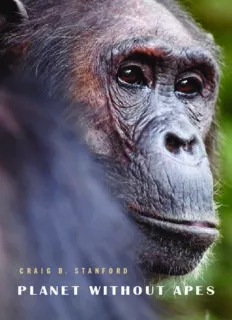Table Of ContentC R A I G B . S T A N F O R D
p l a n e t w i t h o u t a p e s
PLANET WITHOUT APES
PLANET WITHOUT APES
CRAIG B. STANFORD
The Belknap Press of Harvard University Press
CAMBRIDGE, MASSACHUSETTS
lonDon, EnG lAnD
2012
Dedicated to the many individuals around the globe
who have devoted their lives to the protection and
conservation of the last remaining great apes
Copyright © 2012 by the President and
Fellows of Harvard College
All rights reserved
Printed in the United States of America
Library of Congress Cataloging- in- Publication Data
Stanford, Craig B. (Craig Britton), 1956–
Planet without apes / Craig B. Stanford.
p. cm.
Includes bibliographical references and index.
isbn 978-0-674-06704-2 (alk. paper)
1. Apes 2. Endangered species. 3. Extinct animals. I. Title.
Ql737.P96S733 2012
599.88—dc23 2012023985
Contents
Prologue: Save the Apes! 1
ONE Heart of Darkness 8
TWO Homeless 37
THREE Bushmeat 73
FOUR outbreak 103
FIVE In a not- So- Gilded Cage 128
SIX The Double-E dged Sword of Ecotourism 159
SEVEN Ethnocide 191
Epilogue: May There Always Be Apes 222
notes 231
Further Reading 241
Acknowledgments 247
Index 252
PROLOGUE
Save the Apes!
There are seven billion people on Earth today. Meanwhile, the
population of our next-o f- kin is plummeting to extinction. Af-
ter millions of years of co- existence with humans, they have
been nearly exterminated within a few de cades and seem des-
tined to go the way of the American bison, the giant panda, and
the tiger; reduced to such pathetically low numbers that they
exist only in carefully managed, protected areas. As in other
genocides, the world watches, wrings its hands, but does very
little to stop it. The result of the slaughter will be that the great
apes, our closest relatives on Earth, will be effectively gone.
They will hardly be alone; there is a mass extinction afoot such
as our planet has never seen. There have been at least five mass
extinctions in Earth’s his tory. During each a sig nifi cant por-
tion of the plants and animals disappeared. The biologist Stuart
Pimm and his colleagues estimate the current extinction rate to
1
PLANET WITHOUT APES
be between one hundred and one thousand times greater than
the rate of species disappearance that has characterized the past
half- billion years. In other words, we are in the midst of the
sixth mass extinction, and it has barely begun.
Given that all animals are at risk from our rape of the Earth,
why should we be so concerned about just four species—the
chimpanzee, gorilla, bonobo, and orangutan—among the many
millions alive today? We should care because these four crea-
tures are our lifeline. They are our last remaining links to our
evolutionary past, and they tell us a great deal about who we are
today. Allowing them to die would be like allowing our ex-
tended family to die. But we are not allowing them to perish
through benign neglect. Humans have carried out a campaign
of extermination against the great apes that has reached epic
proportions. It has pushed two of the ape species to the brink of
extinction in the wild, with the remaining two not far behind.
Great apes have the tragic misfortune to live only in the
most impoverished regions of the Earth. Their tropical forest
homes are surrounded by people living in abject poverty, for
whom protecting a rare animal is inconsequential compared to
feeding a family. The apes live long lives, maturing slowly and
reproducing at a very slow pace, and so are unable to withstand
the panoply of threats that now envelop them. Their forests are
being cut down beneath them. Their meat is relished by people.
They are subject to all the diseases that afflict humans and have
suf fered massive epidemics from emerging viruses. They con-
2
SAVE THE APES!
tinue to be taken from the wild to serve as labo ra tory animals,
circus performers, and household pets. After millennia of co-
existing with people, the great apes face an onslaught of trouble
that has caused them to plummet toward extinction across their
ranges in Africa and Asia.
Why should we care? That is the question that conserva-
tionists have tried to answer for the public for generations,
whether the cause was Save the Whales, Save the Rain Forests,
or save anything else. Perhaps the question we need to ask in
this case is why we should care more about the great apes than
we might care about the myriad other animals in need of our
protection. After all, a gorilla is not as beautiful as a tiger, or
as charismatic as a giant panda, or as im por tant to global eco-
systems as honey bees. We care about the great apes first and
foremost because they are us. They are largely the same ge-
netic material of which we are made—our evolutionary closest
kin. They are like humans in ways that blur the distinctions be-
tween us.
How intelligent is an ape? There is a chimpanzee in a lab
in Japan who can remember numerical sequences better than
you or I can. There are chimpanzees who talk to themselves,
making signs with their fingers as they absent- mindedly leaf
through a magazine or chat with each other. There is a bonobo
who has learned to make a stone tool in much the same way our
ancestors did, and who has come to treat the best tools he has
made as valued creations. A chimpanzee in a zoo in Sweden
3
Description:Planet Without Apes demands that we consider whether we can live with the consequences of wiping our closest relatives off the face of the Earth. Leading primatologist Craig Stanford warns that extinction of the great apes—chimpanzees, bonobos, gorillas, and orangutans—threatens to become a real

